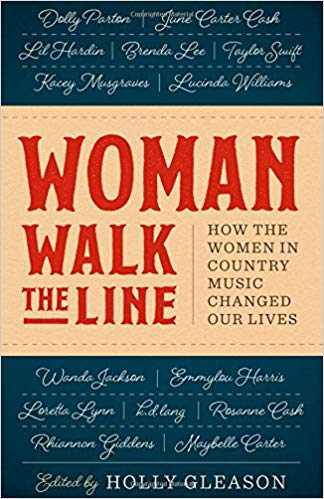Now Playing
Current DJ: Commodore Jones
Steve Earle Billy and Bonnie from I Feel Alright (E-Squared) Add to Collection
Requests? 773-DJ-SONGS or .(JavaScript must be enabled to view this email address)
 by Josh Friedberg
by Josh Friedberg
Woman Walk the Line: How the Women in Country Music Changed Our Lives, edited by Holly Gleason
I’ve read a few books on country music, but none has touched me as much as the 2017 collection of personal essays, Woman Walk the Line: How the Women in Country Music Changed Our Lives. Editor Holly Gleason compiles an impressive range of voices to discuss the female country artist that means the most to them, and the results do not disappoint.
Gleason writes in the introduction of country as “in many ways women’s music,” accommodating and welcoming a range of women uncommon “in any other genre.” The book makes a solid case for this claim, with working-class heroines and Ivy League graduates, visual magnets and pre-televisual icons, some who wore their biographies on their sleeves and others who shrouded their lives in mystery, heterosexuals and LGBT people, and whites and women of color all sharing space and changing lives.
Woman Walk the Line is a welcome, progressive intervention in the field of music and Gender Studies, one that reclaims the diversity in a genre too often coded as male and white. The authors are just as diverse: critics, journalists, musicians, professional songwriters, food writers, and misfits of different kinds, all of whom share a palpable sense of why they love these artists so much.
Though a quick scan through the table of contents reveals there’s no essays on Patsy Cline, Tammy Wynette, Reba McEntire, and others, what’s here doesn’t feel limiting by any means. In other words, this is not a canon of Great Women of Country, but merely a selection of women writers across disciplines and fields whose passion for the music comes through on every page.
From Rosanne Cash eulogizing her stepmother, June Carter Cash, to Rosanne Cash’s own legacy as a singer-songwriter inspiring a transgender woman, Deborah Sprague, to affirm herself; from multiple music industry insiders following the trails of Lil Hardin, Loretta Lynn, Patty Loveless, and others to having the music of Emmylou Harris help heal food writer Ali Berlow’s overwhelming grief and Barbara Mandrell’s independent spirit inspiring museum maven Shelby Morrison assert her business goals, the essays in this book consistently inspire recognition, laughter, and tears across gender and audience. The book also helped me appreciate, for me, new dimensions of Linda Ronstadt, Taylor Swift, and others who have faced head on the challenges for women in the music industry.
Musician Wynton Marsalis once said about jazz, “It’s the range of humanity that’s in this music!” As this book shows, the same can and should be said about country.
Next entry: Music and Malt: Beermiscuous and Spiteful Brewing
Previous entry: @CHIRPRadio (Week of July 30)